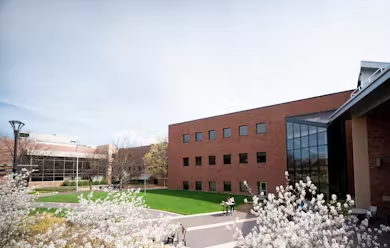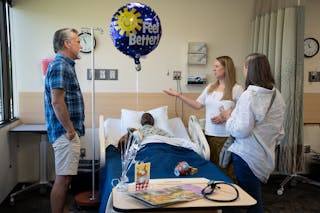
At a glance
Delivery
Blended
Finish in as few as
15-20 months
Cost per credit
$857
Contact us
Request information
Interested in learning more about Bethel's post-baccalaureate nursing program? Fill out this simple form and we'll send you more information soon.Connect with a counselor
They’ll answer your questions, connect you with professors, and help you find the right time to visit campus. They’ll be there every step of the way to help make applying to Bethel as smooth as possible.
Program highlights
Leading the way
Bethel’s post-baccalaureate nursing program is one of only a few in Minnesota—and in the Midwest.
Accelerated pathway to licensure
Created for students who already have a non-nursing bachelor’s degree, this accelerated program takes just 15-20 months. You'll graduate quickly and be eligible to apply to take the NCLEX® licensure examination for registered nurses.
Faith-based approach
Along with strong nursing education, our program provides you with a strong foundation of Christian values that will equip you to practice compassionate patient care.
Compassionate faculty
Bethel nursing faculty care about students. They love to serve as mentors and meet students wherever they’re at in life, education, and career.
Designed to meet your needs
This hybrid program offers a blend of online and in-person learning, with a convenient schedule that works well for busy adults with a variety of learning preferences.
Brace scholarship funding
Pursue one of 25 $500 scholarships for new students in this program, provided by Bethel donors Ray and Genevieve Brace. Scholarships are renewable each term for students making good academic progress.
Recent News
Bethel launches the Anderson Family College of Health Sciences
With a generous $20 million dollar gift, Bethel positions itself to be a leader in excellent faith-based healthcare education in the Midwest through the Anderson Family College of Health Sciences.
October 10, 2024 | 9 a.m.
Celebrating Excellence: the 2024 Campus Compact Award recipients
Learn more about the inspiring stories and meaningful work of the Campus Compact Award recipients.
June 05, 2024 | 10:45 a.m.
Bethel’s New Post-Baccalaureate Nursing Lab Brings Key Training Space for Aspiring Nurses
Leaders in Bethel’s post-bacc nursing program are thrilled to open the new Post-Baccalaureate Nursing Lab later this month. The new space allows the program to add a second cohort, doubling the number of students in the program. And it will provide essential learning spaces for adult students who are returning to school to seek a career change to nursing.
August 08, 2023 | 11:45 a.m.
Upcoming Events
NOV 13 2025
Learning Lab: Building Strong Student Teams
3:30 p.m.
Explore best practices for making group learning successful
DEC 2 2025
3:30 p.m.
Findings from a recent research study about the AI Assessment Scale
Discover learning that fits your life.

Now more than ever, our world needs compassionate and knowledgeable healthcare providers. Bethel’s post-baccalaureate nursing program offers you the unique opportunity to meet that need, live out your calling, and step into a new career in nursing—regardless of the field in which you earned your bachelor’s degree. With compassionate professors who teach from a faith-based perspective, you’ll find an environment that both challenges and supports you as you prepare to care for patients with compassion, integrity, and skill.
29%
of all recent undergrad alumni work in health care
- U.S. Census Bureau$91,403
average salary for nursing alumni 10 years after graduation
- U.S. Census Bureau$71,000
median starting salary for nurses in Minnesota

Bethel’s new Post-Baccalaureate Nursing program, designed specifically for adult learners, will equip students to become the nurses our world needs through a mix of experiences: online, skills and simulation intensives, and clinical. I can’t wait to see how graduates of this program impact their world and enhance the already excellent reputation of Bethel nursing.
Kristi Gustafsonprogram director
Career Outcomes
Wondering what you can do with a nursing degree?
After Bethel’s post-baccalaureate nursing program, you’ll leave with a bachelor of science in nursing (B.S.N) and the competencies you need to succeed in entry-level nursing positions. You'll be equipped to take, and pass, the NCLEX® exam for registered nurses.
Skills
Learn how to:
- Think critically
- Apply research to patient care
- Make informed clinical decisions
- Understand the role of professional nursing practice
- Focus on underserved populations
- Examine the impact of culture on health and illness
- Develop leadership skills
- Communicate effectively
Careers
Our graduates work in:
- Hospitals
- Speciality care units
- Public health agencies
- Schools
- Clinics
- Emergency care settings
- Home care
- Hospice and palliative care
- Missions
- Pharmaceuticals
- Medical device companies
Employers
Our graduates work at places like:
- Allina Health
- M Health Fairview
- Children's Minnesota
- HealthPartners
- Hennepin Healthcare
- North Memorial Health

Start your journey
Apply now
You're called to accomplish incredible things. Take the next step in your career and fill out our simple, straightforward application today.
Explore related programs


Frequently Asked Questions
- Accelerated nursing programs (also known as post-baccalaureate nursing programs) are designed for students who’ve already earned their bachelor’s degree in a non-nursing field. Through Bethel’s accelerated post-baccalaureate nursing program, you can earn a bachelor of science in nursing (BSN) in as few as 15-20 months.
- A baccalaureate degree (also known as a bachelor’s degree) in nursing is a four-year degree that signifies you’ve been equipped with all the skills and competencies you need to offer excellent patient care. Bethel University’s accelerated post-baccalaureate nursing program was created for students who already hold a bachelor’s degree in a non-nursing field. Upon graduation from the program, you’ll have earned a bachelor of science in nursing (BSN).
- Healthcare is booming right now, and nursing is one of the most flexible career paths within this sector. With a bachelor's degree in nursing, you can serve in hospital roles, public health, schools, clinics, emergency rooms, home care, hospice and palliative care, or even the mission field. Because of the high demand for nurses in these diverse settings, you may be able to fit your role or schedule to your different interests of stages of life.
-
There are several pathways into a nursing career, including:
- a traditional undergraduate nursing degree (bachelor's in nursing): typically full-time, intended for those who've recently completed high school, and includes nursing coursework as well as general education experiences
- an accelerated (post-baccalaureate) Bachelor of Science in Nursing (ABSN): for those who've already completed a non-nursing bachelor's degree and want to pivot into a nursing career quickly, with less cost
- an entry-level master's in nursing: a longer program for those who have a non-nursing bachelor's degree and want to do a consolidated bachelor's/master's program in order to pursue nursing leadership roles
These programs differ quite a bit in format, length, cost, and results. You'll want to spend some time thinking about your ultimate career goals, how long you want to study, and how much you want to spend on your degree in order to choose the right pathway for you. Check out this blog post for more information about the differences between these degree pathways, and how to determine which route to take on your way to becoming a nurse.
- An accelerated BSN (ABSN) program is different from a traditional BSN program because it allows you to build on your previously earned bachelor’s degree, rather than starting from square one. If you’ve already earned a bachelor’s degree in a different field and are looking to change careers to nursing, an accelerated BSN—like Bethel’s post-baccalaureate nursing program—may be the best option for you.
- The end result is the same! The accelerated BSN program is created for students who already have an undergraduate degree, so it allows you to meet program requirements with college credits you've already earned—regarless of what you've studied. Most students can finish the accelerated BSN program within 15-20 months when they go through the post-baccalaureate program, compared to four years or more in Bethel's traditional undergraduate program.
-
At Bethel, you'll need to have an undergraduate (baccalaureate) degree from a regionally accredited or internatoinally recognized as equivalent) institution. You must have a 2.85 GPA or higher, with a cumulative GPA of 3.0 or higher, on all prerequistre courses. You must have taken:
- Anatomy (4 credit including lab, with a grade of C or higher)
- General Chemistry (4 credit including lab, with a grade of C or higher)
- Physiology (4 credit including lab, with a grade of C or higher)
- Microbiology (3-4 credits including lab, with a grade of C or higher)
- Nutrition (3 credits, with a grade of C or higher)
- Lifespan / Developmental Psychology (2-3 credit, with a grade of C or higher.)
- This is a blended, or hybrid, program. You'll complete over half of your coursework online, along with some face-to-face sessions at our campus in St. Paul, Minnesota.
- Yes, and we’ll explain why—but first, it’s important to clarify that through Bethel’s post-baccalaureate nursing program, students who already hold a bachelor’s degree can earn their BSN (which traditionally takes four years) in less than two years. Earning your BSN degree, instead of a two-year associate degree, will provide you with a variety of benefits that aren’t always available to nurses with only their LPN or RN certifications. Employers often prefer to hire nurses with their BSN, and nurses with their BSN typically have higher earning potential, more career advancement opportunities, and ultimately a more comprehensive education, which results in better patient care.
- Connect with an enrollment counselor regarding any questions you have about Bethel’s post-baccalaureate nursing program. They can walk you through the requirements, any prerequisites, and the application process. 1. Apply to Bethel’s post-baccalaureate nursing program to earn your BSN. 2. Complete your BSN over the span of 15-20 months. The program will include coursework, labs, and clinicals. 3. After graduation, take the National Council Licensure Examination (NCLEX). The NCLEX determines your readiness to practice as a nurse. 4. After passing the NCLEX, you’ll apply for your nursing license in the state you intend to practice nursing. Upon meeting the requirements, you’ll be licensed and prepared to pursue a career as a professional nurse.
- The Bureau of Labor Statistics (bls.gov) shows 2023 median pay for registered nurses as $86,070 per year or $41.38 per hour. The industry is growing faster than average, with an additional 200,000 nurses needed nationally within the next decade.
- Earning your BSN will prepare you to offer more comprehensive patient care. In addition to practical nursing competencies, you’ll develop critical thinking skills and leadership skills. You’ll also have more career options, increased job security, and higher income potential than if you opt for a two-year associate’s degree.
- Bethel's nursing programs have been specifically created to prepare students well for the National Council Licensure Examination (NCLEX-RN), which tests standard nursing skills and knowledge and provides licensure for a career in nursing. Bethel has a 40-year track record of excellence in nursing, plus robust academic support services, tutoring, and study sessions, so you'll be well-equipped for the NCLEX!




The baccalaureate degree program in nursing at Bethel University is accredited by the Commission on Collegiate Nursing Education (http://www.ccneaccreditation.org). Find out whether this program meets the licensure requirements for your state here.